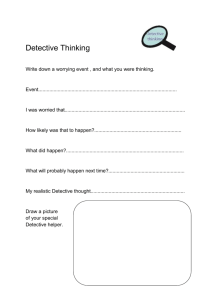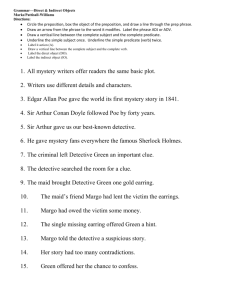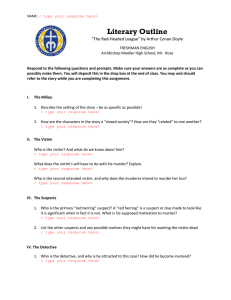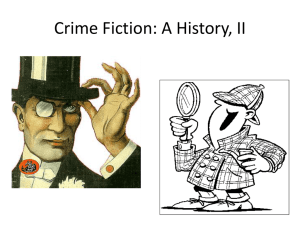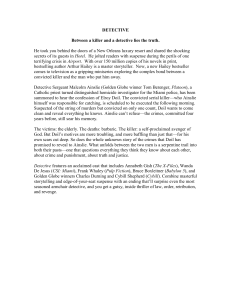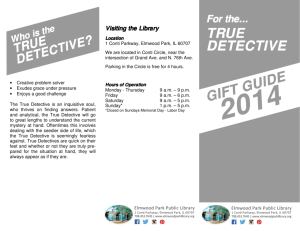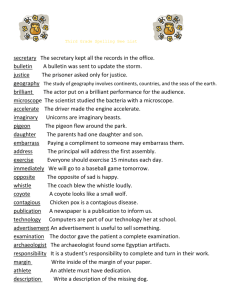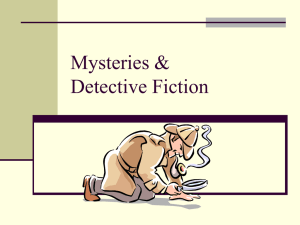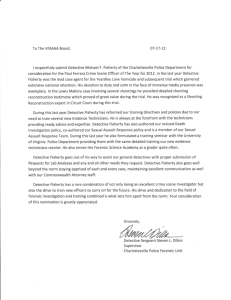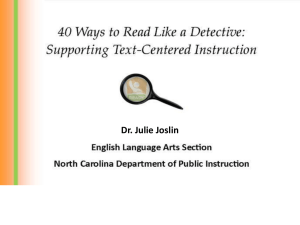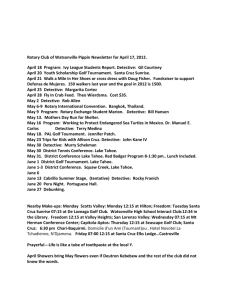Detection Fiction Fact
advertisement
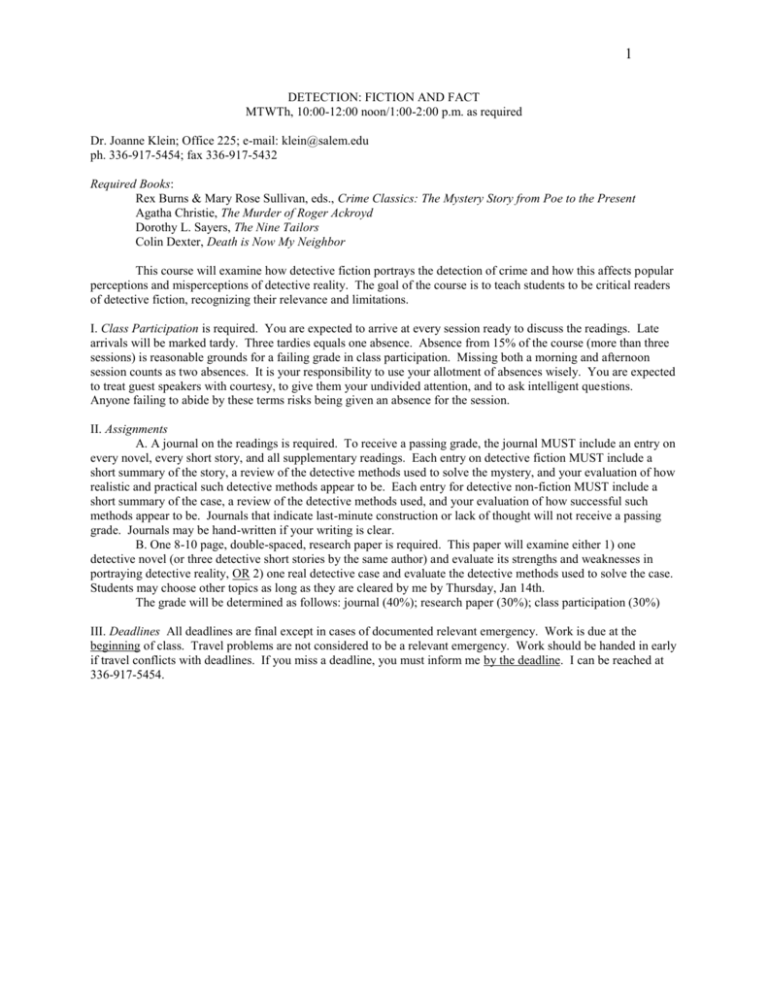
1 DETECTION: FICTION AND FACT MTWTh, 10:00-12:00 noon/1:00-2:00 p.m. as required Dr. Joanne Klein; Office 225; e-mail: klein@salem.edu ph. 336-917-5454; fax 336-917-5432 Required Books: Rex Burns & Mary Rose Sullivan, eds., Crime Classics: The Mystery Story from Poe to the Present Agatha Christie, The Murder of Roger Ackroyd Dorothy L. Sayers, The Nine Tailors Colin Dexter, Death is Now My Neighbor This course will examine how detective fiction portrays the detection of crime and how this affects popular perceptions and misperceptions of detective reality. The goal of the course is to teach students to be critical readers of detective fiction, recognizing their relevance and limitations. I. Class Participation is required. You are expected to arrive at every session ready to discuss the readings. Late arrivals will be marked tardy. Three tardies equals one absence. Absence from 15% of the course (more than three sessions) is reasonable grounds for a failing grade in class participation. Missing both a morning and afternoon session counts as two absences. It is your responsibility to use your allotment of absences wisely. You are expected to treat guest speakers with courtesy, to give them your undivided attention, and to ask intelligent questions. Anyone failing to abide by these terms risks being given an absence for the session. II. Assignments A. A journal on the readings is required. To receive a passing grade, the journal MUST include an entry on every novel, every short story, and all supplementary readings. Each entry on detective fiction MUST include a short summary of the story, a review of the detective methods used to solve the mystery, and your evaluation of how realistic and practical such detective methods appear to be. Each entry for detective non-fiction MUST include a short summary of the case, a review of the detective methods used, and your evaluation of how successful such methods appear to be. Journals that indicate last-minute construction or lack of thought will not receive a passing grade. Journals may be hand-written if your writing is clear. B. One 8-10 page, double-spaced, research paper is required. This paper will examine either 1) one detective novel (or three detective short stories by the same author) and evaluate its strengths and weaknesses in portraying detective reality, OR 2) one real detective case and evaluate the detective methods used to solve the case. Students may choose other topics as long as they are cleared by me by Thursday, Jan 14th. The grade will be determined as follows: journal (40%); research paper (30%); class participation (30%) III. Deadlines All deadlines are final except in cases of documented relevant emergency. Work is due at the beginning of class. Travel problems are not considered to be a relevant emergency. Work should be handed in early if travel conflicts with deadlines. If you miss a deadline, you must inform me by the deadline. I can be reached at 336-917-5454. 2 WRITING ASSIGNMENT: GENERAL GUIDELINES Physical Requirements - The paper will be double-spaced and typed using a standard font with one-inch margins. Hand-written papers, single-spaced papers or unusual fonts will not be accepted. Your name and relevant information will appear in the upper left-hand corner of the first page. No covers or cover sheets will be used. Page numbers will appear in the upper right-hand corner of all pages. A bibliography listing the sources used must be included at the end of the paper. Plagiarism is cheating, even if unintentional, and will be treated accordingly. Anyone plagiarizing from books, other students, or any other source will receive a zero for that assignment. Anyone turning in someone else's work and claiming it as their own will fail the course. Writing History requires not only organizing your material but drawing conclusions from your material. Analyze, do not simply summarize. Papers should begin with an introduction that presents a specific and clear argument and end with a conclusion that reiterates this argument. Each paragraph should cover a specific topic and be introduced by a strong topic sentence that presents the idea to be examined in that paragraph. Your ideas need to be supported by examples. All quotations need to be accurate and properly cited. Papers must be proofread for grammar, spelling and punctuation. Guidelines particular to this professor 1. Write in the third person. Do not use "I", "we", "you", "one", "the reader" or any other word that draws attention to the writer or reader. 2. Never assume conclusions are obvious; tell me what you mean. 3. This is not a murder mystery. Do not save your exciting conclusions for the last page. Put them in the introduction. 4. Your basic goal is to communicate your ideas successfully. Therefore, use straightforward vocabulary and sentence structure. 5. Be specific. If you are not sure what you mean, do not say it. 6. Be brief and to the point. 7. Use specific examples to support and illustrate your points. 8. Use past tense when describing past events. 9. Write out a number (twenty-five) unless it is a complex number (943). 10. Do not use contractions (don't; can't); write words out (do not; cannot). 11. Never use slang or colloquialisms (such as "a lot" or "kids"). 12. Do not use "etc." 13. Do not use "interesting." 14. Do not use parentheticals except for citation. 15. Do not use rhetorical questions (such as "Was Sherlock Holmes a genius?"). 16. Remember to ask me questions about assignments well before assignments are due. All questions should be asked before papers are handed in. 17. Remember to check for spelling errors, grammatical errors and typographical errors before you hand in your paper. 18. Do not use plastic covers; use a staple. 19. Keep a copy of your paper just in case your paper is lost. 3 COURSE CALENDAR 1/4 am Introduction 1/5 am “The Murders in the Rue Morgue” (1841) Edgar Allan Poe “Purloined Letter” (1845) Edgar Allan Poe 1/6 am 1/6 pm Guest Speaker - Breaking and Entering Detection My Search for Jack the Ripper (handout) “A Scandal in Bohemia” (1891) Arthur Conan Doyle “The Adventure of the Speckled Band” (1892) Arthur Conan Doyle “The Problem of Cell 13” (1905) Jacques Futrelle JOURNAL DUE _____________________________________________________________________________ 1/7 am 1/11 am “The Invisible Man” (1911) G. K. Chesterton “A Jury of Her Peers” (1917) Susan Glaspell “The House in Turk Street” (1924) Dashiell Hammett 1/12 am Prime Suspect (part I) 1/13 am Murder of Roger Ackroyd “The Blue Geranium” (1929) Agatha Christie The Story of Scotland Yard (handout) 1/13 pm 1/14 am Guest Speaker - Homicide Detection JOURNAL DUE _____________________________________________________________________________ 1/18 Martin Luther King, Jr., Day - no class 1/19 am 1/19 pm Prime Suspect (part II) “The Case of Oscar Brodski” (1912) Austin Freeman (handout) “Murder at the Automat” (1937) Cornell Woolrich 1/20 am Guest Speaker - Forensic Pathology 1/21 am The Nine Tailors “The Adventurous Exploit of the Cave of Ali Baba” (1928) Dorothy L. Sayers JOURNAL DUE _____________________________________________________________________________ 1/25 pm “Hand Upon the Waters” (1939) William Faulkner “Death and the Compass” (1945) Jorge Luís Borges; trans. by Anthony Kerrigan “The Adventure of Abraham Lincoln’s Clue” (1965) Ellery Queen The Science of Detection (handout) 1/26 am Guest Speaker - Police ID Unit 1/27 am Death is Now My Neighbor 1/28 am “The Comforts of Home” (1960) Flannery O’Connor “The Sleeping Dog” (1965) Ross Macdonald “Sadie When She Died” (1973) Ed McBain COMPLETE JOURNAL DUE 1/29 RESEARCH PAPER DUE NO LATER THAN 12 NOON 1/25 am
